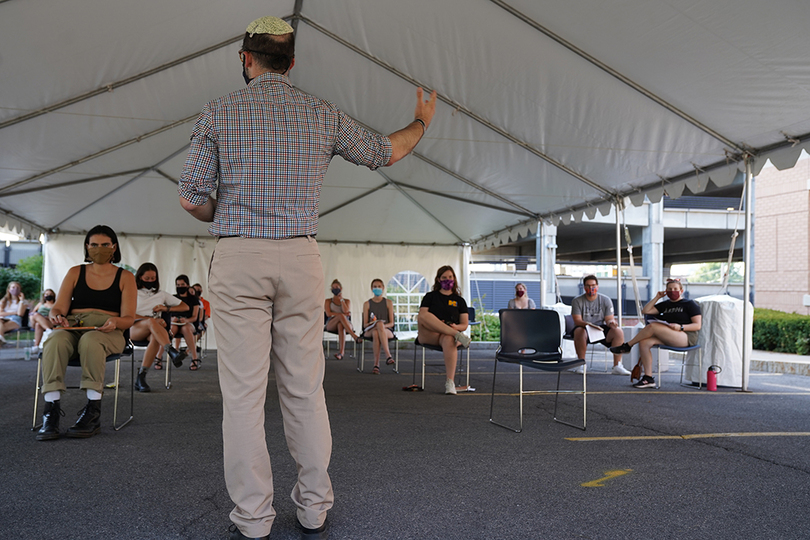SU religious organizations to practice worship while social distancing

Some groups will meet in-person with restrictions while others have switched to online content completely. Emily Steinberger | Photo Editor
Some religious services and events at Syracuse University will take place virtually this fall, while others will occur in-person with social distancing measures in place.
Hendricks Chapel is hosting services in person for the first time since March, after staff worked over the summer to determine how religious programs could take place safely. The chapel, which can hold up to 1,000 people, will limit gatherings to 50 people with social distancing in place, said Hendricks Chapel Dean Brian Konkol.
Multiple religious groups on campus, including the Muslim Students’ Association, have resumed in-person worship.
“When we pray shoulder to shoulder to shoulder, it is meaningful,” said Amir Duric, imam and Islamic chaplain at SU. “You have (a) better sense of community and connection among each other. Although this is new situation for us, in Islam, we do respect it because one of the most important higher objectives is protection of life.”
MSA runs daily prayer services in addition to its traditional Friday afternoon Juma service, Duric said. While students usually pray shoulder to shoulder, MSA will now be providing individual prayer mats so students can practice social distancing, he said.
Syracuse Hillel will continue running its Friday evening services in person, though the services will look different with restrictions on singing and capacity, said Joel Goldstein, campus rabbi. Since Hillel’s outdoor tent can accommodate only 20 people for services, students will have to make reservations to attend, he said.
While the service is usually full of song, Hillel’s services will now focus on movement, as singing poses a greater risk of spreading coronavirus, Goldstein said.
“There’s nothing more powerful in some ways than a pack praying together, and we’re not going to have that,” Goldstein said. “We’re going to somehow find a way to honor the power of everybody having their own space.”
Sarah Cossman, Hillel’s religious vice president, will also run a virtual service for those unable to attend in person.
SU’s Catholic Center will continue to run its Sunday, Wednesday and Thursday masses, said Roman Catholic Chaplain Gerry Waterman. The Catholic Center can safely accommodate 55 people in its large chapel and will live stream services for those who cannot attend, he said.
“Everybody will be in a mask and there will be minimal singing, if any,” Waterman said. “They are allowed to come up one at a time to receive the Eucharist and Holy Communion with a mask.”
The Zen Center of Syracuse will continue running meditations both in person and online, said JoAnn Cooke, Buddhist chaplain at SU.
The meditation leader, either a student or one of the staff members at the Zen Center, will decide whether to run the meditation virtually or in person, she said. Cooke’s Wednesday meditation will take place in person every week in the main chapel.
“The fact that it’s a silent meditation, we’re not going to be talking or singing or, you know, pushing our voice across the room,” Cooke said. “Meditation is something that’s really a lot better in person.”
Other religious programs at SU have chosen to solely conduct virtual programming this fall.
Melvin Baker, chaplain of the Historically Black Church Chaplaincy, plans to utilize Instagram more throughout this semester to engage with students. His Wednesday Night Life program, an evening service for students from SU and LeMoyne, will continue to take place virtually throughout the semester.
“I’ve been really proud of our team of chaplains and staff that they’ve met this moment,” Konkol said. “There’s something really powerful in this time of crisis — multiple crises — that people are trying to find ways to have meaning, purpose, connection.”




